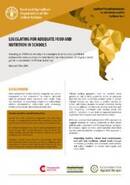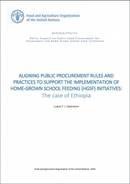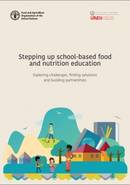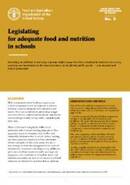Публикации
School feeding laws are important instruments for the realization of the right to adequate food, the right to education, and the right to health of the schoolchildren. In addition, they fulfill a social function guaranteeing access to food of the most vulnerable children in school and the school attendance. This document will cover:
- The Regional and International Framework that serves as the basis for the development of these laws in Latin America and the Caribbean
- The main benefits of adopting an approach to school feeding and nutrition.
- The keys to adequate drafting of a School Feeding Law.
- An overview of the existing laws in the region.
- The general provisions to contain the School Feeding laws.
- And the necessary parliamentary actions to make this right effective.
This guidance note describes an approach aimed at improving food security and nutrition through education systems, with a specific focus on schools. Furthermore, the note intends to support policy-makers, advisors and other relevant stakeholders in promoting greater coherence between education, agriculture, nutrition and other policies and programmes; particularly, on how the policy agenda for the education sector can be leveraged for better nutrition and food security without compromising its own priorities.
Building on the experiences of various countries and on an in-depth analysis of Ethiopia's public procurement rules and practices in the context of school feeding, the report provides recommendations on the alignment of public procurement rules and practices to support the implementation of HGSF initiatives in the country.
The consultation “Stepping up School-based Food and Nutrition Education: Exploring Challenges, Finding Solutions and Building Partnerships,” organised by FAO in collaboration with the United Arab Emirates University was the first specialized global meeting of its kind. It provided stakeholders from different fields of expertise working with school-based programmes a platform to discuss challenges and define priorities, competencies and educational innovations with the main focus on SFNE.
Multi-component school feeding programs are widely recognized as key instruments to achieve children’s right to adequate food, education and health. They can contribute to preventing hunger and malnutrition, address micronutrient deficiencies and encourage healthy eating habits, depending on their aims.





